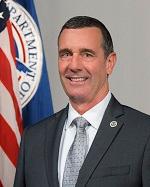
Smiths Detection’s winning bid on a nearly $97 million contract for advanced carry-on baggage scanners at U.S. airport checkpoints came in was far less than expected, Transportation Security Agency Administrator David Pekoske said on Tuesday. The price offered by Smiths Detection was “substantially less than our budge estimate,” Pekoske said of the five-year, $96.8 million contract TSA awarded the company on March 28 for the first 300 computed tomography (CT) checkpoint scanners. Pekoske said in a statement last week when…

 By
By 











